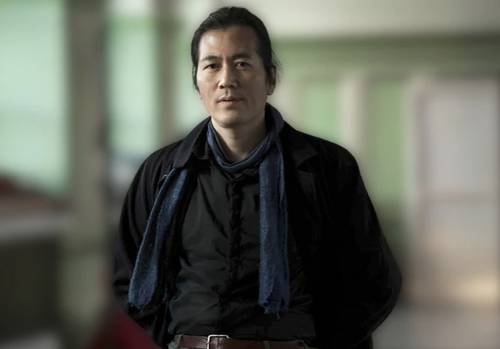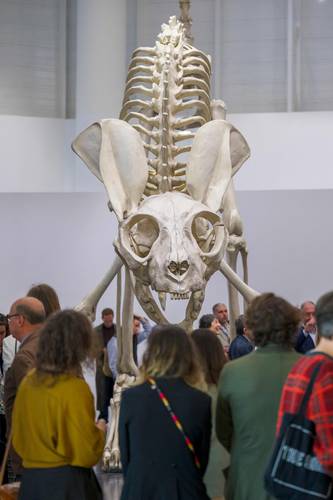They merge dance and painting to narrate the deterioration and resistance of memory.

They merge dance and painting to narrate the deterioration and resistance of memory.
Fabiola Palapa Quijas
La Jornada Newspaper, Thursday, May 8, 2025, p. 4
Choreographer Bárbara Alvarado, in her work Loss of Memory , creates a space for reflection by exploring the complexity of the human experience and the importance of reinventing oneself in diverse situations until we find new meanings in life.
From today through Sunday, the Benito Juárez Theater will host a performance that fuses dance, music, and painting, where the body becomes a paintbrush and the stage becomes a canvas that narrates the deterioration and resilience of memory.
In an interview with La Jornada , Alvarado explains that her work is inspired by several things at the same time, including her personal experience after suffering a knee injury that forced her to rethink her life and career.
I wondered who I am if I can't dance, if I can't do what I love. I realized that the greatest fear we have in life isn't death, but ceasing to mean anything to others
. This reflection led her to explore the idea of memory and how it relates to our identity and our experiences.
Amidst boleros, Chopin, and the legendary XEW, the choreographic proposal presents the story of a couple struggling with memory loss. Alvarado seeks to shed light on the process of Alzheimer's and how it affects people and their relationships.
Renaissance and resignification
The work poses questions and at the same time illustrates a real force, which is the vital essence, this life force to reawaken, to try life again, and to die again. It's a natural process of forgetting and death, but also of rebirth and redefinition
, the creator shares.
This is a living exhibition in which dance and art intertwine to narrate the life of a painter with Alzheimer's and her life partner, who inhabit a poetic space between memory and oblivion.

▲ The greatest fear we have in life is not death, but ceasing to mean something to others
, said Bárbara Alvarado regarding the piece "Loss of Memory ." Photo courtesy of the choreographer.
The protagonist in her bathtub is reborn each time to return to her partner. Through his paintings, he calls her again and again, trapping her in a shared memory. "We are potentially many possibilities, and psycho-emotional or bodily processes make us redefine or change
," Alvarado says.
According to the choreographer, Memory Loss "is a reflection on the process of Alzheimer's, but we go through similar processes in life and don't realize it; we die and are reborn in our meanings, in our memories, and in our search for experiences, and that's necessary to redefine ourselves."
People with Alzheimer's begin to forget things, and what they need is to disconnect from the world, because that world doesn't provide a bridge back to the self. We're immersed in having, in pretending, in showing, but not in cultivating self, in expressing ourselves. That's reality, and it's everyone's responsibility to redefine human existence.
Alvarado explains that the work is a reminder that life is a process of growth and change. We must be willing to face our fears and find new ways of being and doing
.
Under the direction of Bárbara Alvarado, the Aletheia Cuerpo Escénico de México company presents Loss of Memory at the Benito Juárez Theater (Villalongín 15, Cuauhtémoc neighborhood) from today through Sunday, with performances Thursday and Friday at 8 p.m., Saturday at 7 p.m., and Sunday at 6 p.m.
Byung-Chul Han is awarded the Princess of Asturias Award
The philosopher was awarded in the Communication and Humanities category

▲ Byung-Chul Han has insisted on the need to regain the ability to say no, that not everything is possible, that not everything can be done, that we shouldn't even try. Photo taken from the Princess of Asturias Foundation website.
Armando G. Tejeda
Correspondent
La Jornada Newspaper, Thursday, May 8, 2025, p. 5
Madrid. The philosopher Byung-Chul Han, of South Korean origin but naturalized German, defends slowness in the face of the dizzying subjugation of technology, pointing out the deep contradictions of the digital world in which we are immersed, and does so from a monastic discretion, isolated among his books and writings. Precisely for his brilliance in interpreting the challenges of technological society
, Han was chosen as the new Princess of Asturias Award for Communication and Humanities, an award that in previous years has recognized the work of thinkers such as María Zambrano, Ryszard Kapuściński, and Umberto Eco.
The jury, made up of academics and intellectuals such as Estrella de Diego, Taciana Fisac Badell, Santiago González Suárez, Alma Guillermoprieto, Carmen Riera i Guilera, and Diana Sorensen, among others, explained their decision: "His work reveals an extraordinary capacity to communicate new ideas precisely and directly, drawing on philosophical traditions from both East and West. Han's analysis is extremely fruitful and provides explanations for issues such as dehumanization, digitalization, and the isolation of individuals. His intercultural perspective sheds light on complex phenomena in our contemporary world and has found a wide resonation among audiences of diverse generations
."
Byung-Chul Han was born in Seoul, Republic of Korea, in 1959. He studied German literature and theology at the University of Munich and philosophy at the University of Freiburg, where he received his doctorate in 1994 with a thesis on Martin Heidegger. He taught at the University of Basel (Switzerland, 2000-2012) and was a professor of philosophy and cultural studies at the University of Fine Arts in Berlin. He also taught at the Karlsruhe School of Design, alongside Peter Sloterdijk.
Fatigue Society
The laureate is considered one of the most prominent contemporary philosophers. He has devoted his reflections primarily to what he calls the society of fatigue
and the society of transparency
, as well as to the concept of shanzhai, a neologism that identifies the modes of deconstruction in contemporary practices of Chinese capitalism. In his writings, he has been highly critical of neoliberalism, since for Han, we live in an age of neuronal disorders (depression, chronic fatigue syndrome, attention deficit hyperactivity disorder) caused by an excess of positivity in a society that has abandoned reflection, retreat, and meditation, and therefore does not value individuality. He argues that this is a society increasingly dominated by narcissism and suffering from a loss of desire, in which we become progressively incapable of relating to others, and he insists on the need to regain the ability to say no, that not everything is possible, that not everything can be done, that one shouldn't even try.
In his most recent works, he has broadened his critical approach to contemporary society, incorporating reflections on hope and contemplation. He is considered the successor of philosophers such as Roland Barthes, Giorgio Agamben, and Peter Sloterdijk. Some of his notable books are On Power (2016), The Scent of Time (2015), The Society of Fatigue (2012), Topology of Violence (2016), The Transparency Society (2013), The Agony of Eros (2014), In the Swarm (2014), Psychopolitics : Neoliberalism and New Techniques of Power (2014), The Expulsion of the Different (2017), Good Understanding (2018), and The Crisis of Narrative (2024).
This was the award given out of eight Princess of Asturias Awards this year, the 45th edition of the awards. The awards for Literature, Social Sciences, Arts, Sports, Harmony, Scientific and Technical Research, and International Cooperation will be announced in the coming weeks. As usual, the Princess of Asturias Awards ceremony will be held in October in Oviedo, the capital of Asturias, at the Campoamor Theater.
Celebration of the 15th anniversary of the Centre Pompidou-Metz

▲ The exhibition Endless Sunday: Maurizio Cattelan and the Collection at the Centre Pompidou commemorates the venue's 15th anniversary with a display featuring more than 400 of the artist's works. The exhibition attracted numerous visitors in its initial days and will be open to the public until February 2, 2027. Pictured is the piece titled Felix . Photo: Afp
La Jornada Newspaper, Thursday, May 8, 2025, p. 5
jornada





